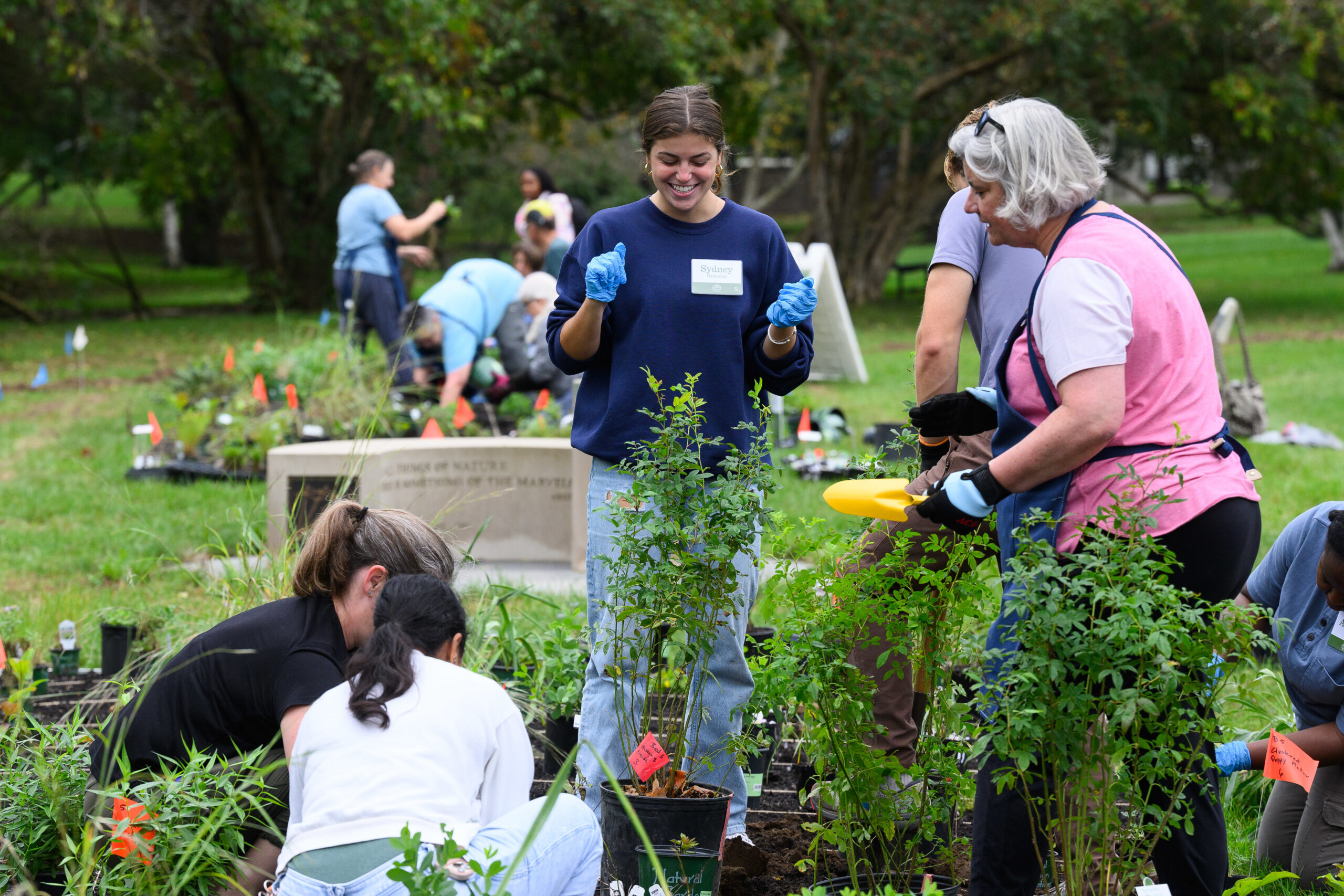Volunteers in collaboration with the Indiana Native Plant Society replant Holcomb Gardens with all native wildlife. Photo courtesy of Butler University.
OLLIE FITZGERALD | STAFF REPORTER | ofitzgerald@butler.edu
Over the past year, the Office of Sustainability started working on multiple projects to help bring campus to the larger goals and deadlines. Student interns have been working on large data-collection efforts to monitor the amount of energy and waste Butler is using and producing. To try and reduce the amount of consumption on campus, it was first important to understand how resources are being used and discarded.
Butler University pledges to be zero waste by 2030 and carbon neutral by 2050. In March 2024, the Center for Urban Ecology and Sustainability became Butler’s Office of Sustainability, shifting its focus from primarily education to collaboration with the Vice President of Finance and Administration. The office — in collaboration with faculty, student interns and President Danko — has been working to increase overall campus sustainability. As part of this initiative, students have been encouraged to complete opt-in modules that teach about overall sustainability.
There are many sustainability initiatives gradually being implemented by the office and its interns. However, there is also an ongoing opt-in pilot program about sustainability education created by staff to teach students about sustainability. The program is looking for student feedback, to eventually incorporate the five-module program into the orientation modules that new students have to complete. Over 10 students are currently enrolled in the pilot program.
The creators of the modules consulted with Eloise Ayotte, a sophomore environmental studies major and founder of the SGA Sustainability Board, during the creation of the modules. Ayotte is currently completing these modules.
Ayotte and her board work with the Office of Sustainability and other on-campus partners to help improve eco-consciousness and encourage students to engage with sustainability.
“There are five modules that are about an hour each, and what I think is so amazing about them is they’re super educational and have different experts from [across] campus,” Ayotte said. “Sustainability is this huge problem that nobody knows [exactly] how to tackle, but the modules break things down into digestible issues with actionable solutions.”
Lauren Crimmins, a senior economics major, is vice president and on the events board of EcoReps, Butler’s only environmental student organization. EcoReps hosts educational sessions about the environment, sustainability and other larger events for students to attend. One main event that EcoReps hosts is their annual clothing swap so students can get rid of old clothes and acquire new ones sustainably.
Crimmins is one of the students taking part in the opt-in modules. She explained that the modules cover the basics of sustainability, biodiversity and ecosystems, human and environmental interactions and climate change.
“I was interested to see what Butler’s approach is to the models and be able to help provide them feedback since [there’s a survey] the end of [the modules],” Crimmins said.
Julia Angstmann, the executive director of the Office of Sustainability, worked on one of the opt-in modules that was specifically about climate change. The module teaches the basics about greenhouse gasses and where they come from as well as how climate change disproportionately impacts disadvantaged communities. Part of the lesson includes teaching students how to calculate their own carbon footprint.
“We’re not just trying to identify problems, so we wanted to make the modules informative but also action oriented,” Angstmann said. “I think there’s a lot of anxiety around climate change already, [so we want] students to feel like they have a role to play, both on campus but also in their personal lives.”
Angstmann also highlighted some of the initiatives that Butler is implementing or planning to implement soon to help reach the 2030 and 2050 goals.
One initiative that was started in the fall was to “re-wild” the campus. This includes reducing the implementation and mowing of turf grass, which largely encompasses the grounds of campus. There has also been an increase in intentionally planting native flowers, which are inherently better for the ecosystem. The courtyards of the recently renovated Resco are full of native plants, and over 400 volunteers showed up to help fully replant Holcomb Gardens with native flowers.
There have also been initiatives to decrease energy consumption throughout all campus buildings. Currently, in Irwin Library, the lightbulbs are being replaced with more energy-efficient LEDs.
“[We’re trying] to understand where we need to convert our light fixtures to LED and where we need to add sensors so the lights turn on and off automatically,” Angstmann said.
The Office of Sustainability is also working on implementing AI sensors on dumpsters to gain a sense of the amount of waste that the campus is producing. By gathering this data, the office can work on how to cut down on waste and make sure that it is getting disposed of properly.
Increasing student and staff awareness of environmental issues and sustainability, combined with the recent implementation of the Office of Sustainability aims to help Butler reach their zero waste and carbon neutral pledges. Students can still join the modules and those participating will need to complete them by May 2.



